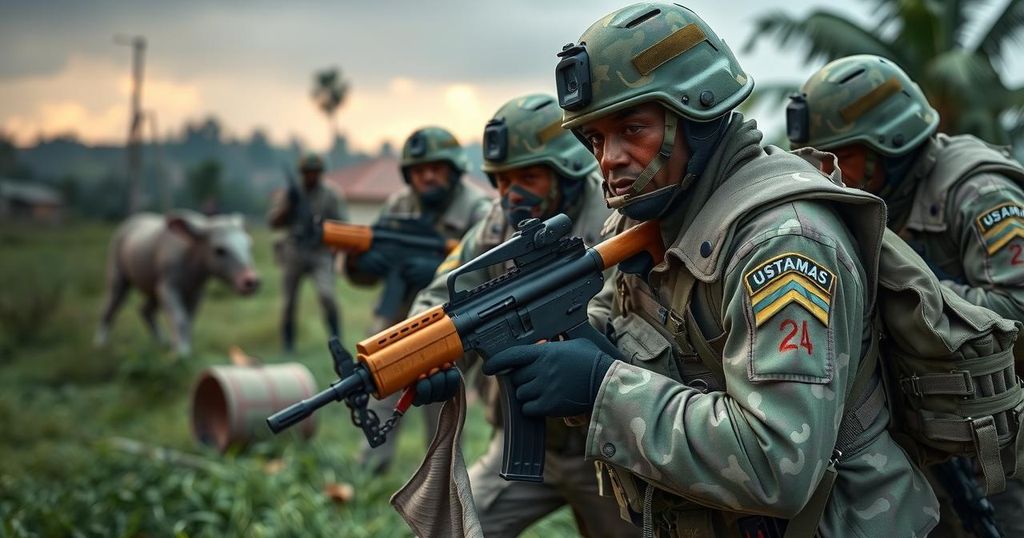In December 2024, heavy fighting in North Kivu, DR Congo, led to the displacement of over 290,000 people due to ongoing clashes between the Congolese army and the M23 rebel group. With a total of 2.7 million displaced individuals in the region, the humanitarian situation worsened, particularly with the resurgence of violence by the ADF. Armed conflicts have significantly deteriorated civilian life and humanitarian conditions, necessitating urgent international attention and intervention.
In the Lubero region of North Kivu, eastern Democratic Republic of Congo, heavy fighting has erupted between the Congolese army and the M23 rebel group, resulting in the displacement of over 290,000 individuals in December 2024. The ongoing conflict compounds a deteriorating humanitarian situation, with a staggering total of approximately 2.7 million displaced persons in North Kivu, as reported by the UN Office for the Coordination of Humanitarian Affairs (OCHA). These hostilities have escalated due to the re-emergence of violence from the Allied Democratic Forces (ADF), a Ugandan rebel group that has allied itself with the Islamic State, further exacerbating the suffering of the civilian population.
The background of the conflict reveals the chaotic dynamics between two distinct rebel groups: the M23 movement, believed to be supported militarily by Rwanda, and the ADF, known for its Islamist policies. The involvement of Rwandan forces has provided M23 with advanced weaponry and strategic intelligence, raising concerns regarding sovereignty and the humanitarian crisis. These complex interactions have resulted in aggressive territorial control shifts, particularly around Masisi, a strategic town that has recently experienced multiple changes in control between the M23 and government forces, alongside pro-government militias.
The persistent clashes between these factions have severely impacted the civilian populace, leading to significant humanitarian needs. As the conflict continues to unfold, international organizations emphasize the importance of addressing the root causes of displacement and regional stability. As the Congolese army and allied militias strive to reclaim territory and regain control over the hills surrounding Masisi, the overall situation remains precarious, with potential humanitarian repercussions escalating in the region.
“The humanitarian situation in the Lubero region of North Kivu continued to deteriorate in December 2024 due to ongoing armed clashes linked to the activities of the M23 rebel movement.” – UN Office for the Coordination of Humanitarian Affairs.
In conclusion, the ongoing conflict in North Kivu is indicative of a broader humanitarian crisis characterized by armed violence, massive displacement, and the involvement of external state actors. The need for comprehensive peace processes and humanitarian support remains critical for ensuring the safety and well-being of the affected populations. Achieving peace and stability is essential to addressing the humanitarian needs and restoring access to basic services in the region.
The conflict in North Kivu, Democratic Republic of Congo, is deeply rooted in historical grievances and the involvement of various armed groups. The M23 and ADF are two notable insurgent groups, each with distinct motivations and influences. Their activities have destabilized the region, resulting in widespread human displacement and significant humanitarian challenges. The international community, including the United Nations, has been monitoring the situation, emphasizing the urgent need for interventions that address both immediate humanitarian needs and long-term peace-building efforts. The region’s dynamics are complicated not only by local factors but also by cross-border influences, particularly from Rwanda, which plays a significant role in the M23’s operational capabilities.
The situation in North Kivu remains dire, with an urgent humanitarian crisis driven by active conflict involving the M23 and ADF. The displacement of over 290,000 individuals in December highlights the critical need for interventions that not only provide immediate relief but also pave the way for sustainable peace initiatives. As regional dynamics evolve, the focus must shift to fostering dialogue and cooperation to mitigate the impact of these conflicts on innocent civilians and ensure their safety and dignity.
Original Source: www.fides.org






